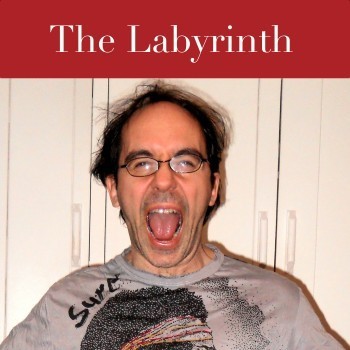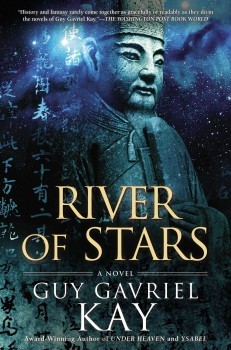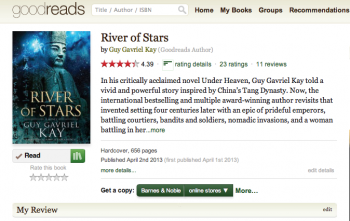Cesar Torres's Blog, page 8
May 6, 2013
Labyrinth 44 – Helene Wecker
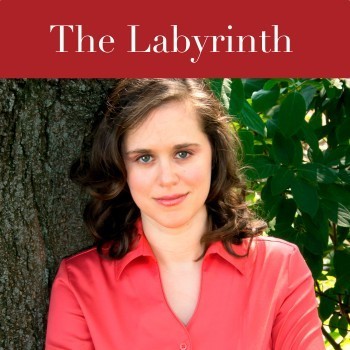 Helene Wecker’s debut novel is “The Golem and the Jinni,” out now from Harper Collins. Helene talked to me about her evolution as a writer through her MFA work at Columbia University. The stories she constructed early on about immigrant families and characters stuck between two worlds transformed over seven years into the final published novel. This book pits two immigrants — a golem from eastern Europe and a jinni from the Middle East — as potential lovers in late 19th-century New York. We talk magic, love, and the strangest thing that ever happened to Helene.
Helene Wecker’s debut novel is “The Golem and the Jinni,” out now from Harper Collins. Helene talked to me about her evolution as a writer through her MFA work at Columbia University. The stories she constructed early on about immigrant families and characters stuck between two worlds transformed over seven years into the final published novel. This book pits two immigrants — a golem from eastern Europe and a jinni from the Middle East — as potential lovers in late 19th-century New York. We talk magic, love, and the strangest thing that ever happened to Helene.
Subscribe and listen
Download and Listen: Labyrinth 44 – Helene Wecker
iTunes
NEW! We’re now on SoundCloud
Subscribe via RSS
Stitcher
Links
Helene Wecker’s web site
April 25, 2013
Labyrinth 43 – Michael Largo
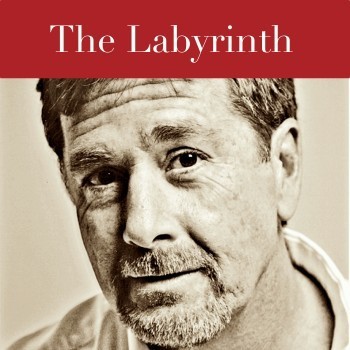 Michael Largo, author of the new book “The Big, Bad Book of Beasts” talked with me about his path to becoming a writer, mythology, nature and science, as well as the ways in which medieval bestiaries reflect the way certain cultures saw (or see) the world. Michael is also the author of several other encyclopedic non-fiction books, a poetry collection, and three novels.
Michael Largo, author of the new book “The Big, Bad Book of Beasts” talked with me about his path to becoming a writer, mythology, nature and science, as well as the ways in which medieval bestiaries reflect the way certain cultures saw (or see) the world. Michael is also the author of several other encyclopedic non-fiction books, a poetry collection, and three novels.
Subscribe and listen
Download and Listen: Labyrinth 43 – Michael Largo
iTunes
NEW! We’re now on SoundCloud
Subscribe via RSS
Stitcher
Links
Michael Largo on Facebook
Michael Largo on Twitter @GodsLunatics
April 19, 2013
Labyrinth 42 – Daniele Bolelli
I am so psyched to welcome back Daniele Bolelli to the Labyrinth. Daniele’s new book “Create Your Own Religion” is a romp through the fallacies, myths and history of some of the major world religions. Daniele suggests that people can find what works for them best and develope their own religion or philosophy, and he does this with humor, wit, and academic attention to detail. Time to roll up our sleeves and talk religion.
Subscribe and listen
Download and Listen: The Labyrinth 42 – Daniele Bolelli
iTunes
NEW! We’re now on SoundCloud
Subscribe via RSS
Stitcher
Links
The Drunken Taoist Podcast
Create Your Own Religion
April 12, 2013
Labyrinth 41 – Guy Gavriel Kay
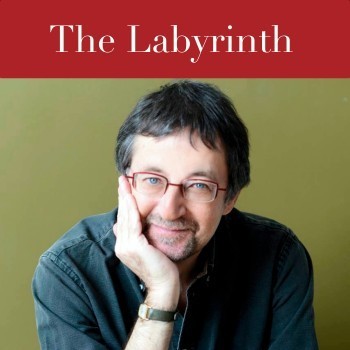 Today I am honored to talk to one of the legends of fantasy, Guy Gavriel Kay. Guy is the author of “The Fionavar Tapestry,” “Under Heaven,” Ysabel,” and he is also a published poet. His new book, “River of Stars,” is an epic fantasy tale set in Kitai, which is inspired by Song Dynasty in 12th century China. Guy also worked with the Christopher Tolkien in his earlier years in compiling materials for “The Silmarillion,” and he talks to us about how that helped shape his future as a fantasist of his own.
Today I am honored to talk to one of the legends of fantasy, Guy Gavriel Kay. Guy is the author of “The Fionavar Tapestry,” “Under Heaven,” Ysabel,” and he is also a published poet. His new book, “River of Stars,” is an epic fantasy tale set in Kitai, which is inspired by Song Dynasty in 12th century China. Guy also worked with the Christopher Tolkien in his earlier years in compiling materials for “The Silmarillion,” and he talks to us about how that helped shape his future as a fantasist of his own.
Subscribe and listen
Download and Listen: The Labyrinth 41 – Guy Gavriel Kay
iTunes
NEW! We’re now on SoundCloud
Subscribe via RSS
Stitcher
Links
Bright Weavings, Guy Gavriel Kay’s Web site
“River of Stars”: What we’re reading: River of Stars by Guy Gavriel Kay
April 9, 2013
Labyrinth: I’m a few days behind, but I have a surprise for you!
I have had a few days’ delay with the show, since I had a guest drop out!
However, I am excited to tell you that the fantasy legend Guy Gavriel Kay is our next guest! That show will be available later this week.
Guy is the best-selling author of several fantasy novels and poetry collections. I just interviewed him at Ars Technica regarding his new epic, “River of Stars”: What we’re reading: River of Stars by Guy Gavriel Kay.
So, look for the new episode to hit your subscription, and sorry for the delay! I like to keep these coming on a weekly basis.
April 2, 2013
What to expect from Amazon’s acquisition of social book site Goodreads
Amazon has acquired the book-recommendation social site Goodreads for $150 million. This is big news that affects not just book consumers, but also authors. Goodreads is a bit of a niche product: It has a devoted following and community of users who review books, but it’s not exactly the most popular book site in the American market. However, the fact that Amazon purchased means that it plays an important role in publishing and how people buy books. If Goodreads wasn’t on your radar in the past five years, well, today’s news should place it there.
 Today the Atlantic provided analysis of the purchase, in which Jordan Weissman explained that Americans aren’t generally big readers (as suggested by survey data). However, they are powerful consumers, and Goodreads provides a platform for influential and voracious readers to promote books via social tools.
Today the Atlantic provided analysis of the purchase, in which Jordan Weissman explained that Americans aren’t generally big readers (as suggested by survey data). However, they are powerful consumers, and Goodreads provides a platform for influential and voracious readers to promote books via social tools.
If you’ve never used Goodreads, I recommend it. It’s sort of like a Facebook for book nerds. You can show other people what’s happening to that stack of books on your nightstand: what you are reading, what you want to read, and what you are putting off (like “War and Peace”).
I think this particular acquisition is one that’s going to have a huge impact on how book reviews and recommendations propagate through the Internet. Yes, let’s face it. In our current ecosystem, the book recommendation is the bookworm’s meme, and these memes are some of the best ways to figure out what’s good, both at the popular level, but also in indie publishing. As Weissman points out, social media, author websites (such as this one, cough cough), and word of mouth continue to become popular ways for book aficionados to receive recommendations.
Gone are the days of thick Sunday edition book sections in city newspapers, where voracious readers read criticism and reviews to inform their future purchases (and borrows). Now it’s up to the masses to provide us with star ratings and reviews of varying degrees of quality.
I would still personally prefer that Amazon weren’t the single most populous place on the Internet to learn about, recommend, and purchase books. No matter what anyone tells you about independent bookstores, and competitors like Apple and Barnes and Noble, Amazon currently has the biggest amount of resources to market itself, and the Goodreads acquisition is bound to help it further in this goal.
On the other hand, the acquisition will probably help the people who love reading books. Being able to compare Amazon reviews to Goodreads reviews (which tend to be more thoughtful and less….wacky), is a good thing. Will that funnel of reviews from Goodreads into Amazon’s mega-shopping experience unfairly drive people to purchase the books from Amazon instead of competitors? Yes, probably so. But we should remember we all get to choose where to buy our books. If there are alternative platforms, or DRM-free publishers (such as Tor, for example) that you support, give them your money. You can simply read the reviews, come to your own decision about the book, and make your purchase wherever you want.
What readers should expect
Amazon will now own two databases of book reviews and recommendations. Amazon.com‘s massive database of purchase history and patterns, reviews and other metadata may improve, if Amazon decides to import or aggregate quality reviews from Goodreads. We’ll have to wait and see if they actually do this. Then there is the Goodreads database, which I think may flourish even more, thanks to the purchase. If Amazon continues to support the Goodreads development team, we may see better features and improvements to the site. However, Goodreads users could find some of their best reviews showcased on Amazon, so keep your eyes open for a change in terms of service. If you want to protect your privacy and don’t like your reviews ported over to Amazon.com, you should make sure you keep up with changes at Goodreads as the platform makes changes using Amazon’s money.
Can you expect better reviews? Not any more than are already out there. I don’t think we’re going to see more mega-readers to be borne from this purchase. I think what you can expect will be an easier way to get to the well-written reviews by people in the Goodreads and Amazon communities who have a good standing and don’t downvote books for silly or esoteric reasons.
What authors should expect
I think authors can expect to put in a little more time into promoting their books into both Amazon and Goodreads, but I think the results will be better. The Goodreads community is a more welcoming place, since it’s it’s less anonymous than Amazon’s, and that means that authors will have better interactions with their readers.
In short, if you are an author and haven’t joined Goodreads to interact with readers of your books, you should do so already. I joined the site in 2007, and I can definitely recommend it. My friends on Goodreads mirror many of my relationships in real life, and that means I get really great book recommendations from the people I know (and some who I discover when I browse for new books). Feel free to friend me on Goodreads, or also on Facebook, where I also post my Goodreads activity to my feed.
By the way, if you’re an author who feels exhausted by having to promote your book in yet another social site, you may want to sit back and do some deep breathing. What I’m going to say next isn’t easy to hear. Social sites are here to stay (at least for a long while), and putting in the work to talk to your readers on a site like Goodreads is a great thing. If you balk at doing this type of work, you need to reconsider your goals in actually building your platform and career. Writing published works has never simply consisted of just writing. There is a role that the author plays in connecting with readers, and you need to decide what that role is for yourself. I think success is partially hidden in this decision.
If you want to find my Goodreads profile and learn more about my books, here is a link to my profile. It also imports my blog posts, so if you want to read my stuff in one single place in Goodreads, now you know how.
What changes do you think will come from Amazon’s purchase of Goodreads? Leave me a note in the comments.
March 29, 2013
Labyrinth 40 – Peter Larson
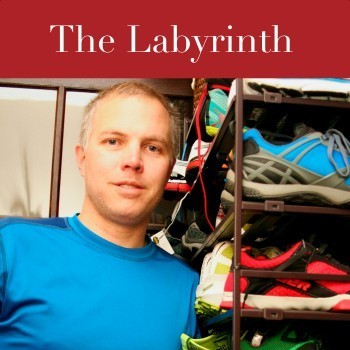 Peter Larson, Ph. D, is the author of the running book “Tread Lightly” and the creator of the running site Runblogger. Pete’s interest in the anatomy of the human foot and the evolutionary aspects of running led him to create his blog, which has been so successful that he will take a leave of absence from his current teaching position at Saint Anselm College in New Hampshire. Though we talk about barefooting for a bit, this show goes deep into all aspects of running and running shoes, and while we’re at it, we tap into the sources of inspiration that prompted Peter to pursue his passion.
Peter Larson, Ph. D, is the author of the running book “Tread Lightly” and the creator of the running site Runblogger. Pete’s interest in the anatomy of the human foot and the evolutionary aspects of running led him to create his blog, which has been so successful that he will take a leave of absence from his current teaching position at Saint Anselm College in New Hampshire. Though we talk about barefooting for a bit, this show goes deep into all aspects of running and running shoes, and while we’re at it, we tap into the sources of inspiration that prompted Peter to pursue his passion.
NOTE: As some of you may have noticed, I made a mistake with the numbering of this episode. Episode 39 is actually James Clear, and Peter Larson takes the 40th spot. Sorry for the inconvenience.
Subscribe and listen
Download and Listen: The Labyrinth 40 – Peter Larson
iTunes
NEW! We’re now on SoundCloud
Subscribe via RSS
Stitcher
Links
Tread Lightly at Amazon.com
Runblogger.com (Running news, shoe reviews, the science of running, barefooting and more)
March 25, 2013
Labyrinth 39 – James Clear
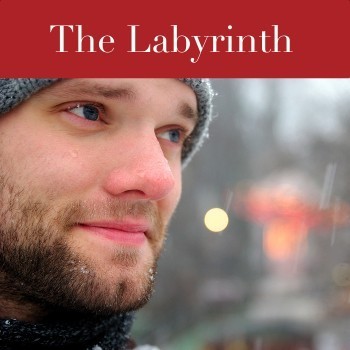 James Clear is a writer, weightlifter, photographer and entrepreneur. He talked about some of his latest insights in nutrition and diet, and also what inspires him. If you liked previous episodes with people like Vanessa Runs, Matthew Fizgerald or Abel James, you’re gonna dig on James.
James Clear is a writer, weightlifter, photographer and entrepreneur. He talked about some of his latest insights in nutrition and diet, and also what inspires him. If you liked previous episodes with people like Vanessa Runs, Matthew Fizgerald or Abel James, you’re gonna dig on James.
Subscribe and listen
Download and Listen: The Labyrinth 30 – James Clear
iTunes
Subscribe via RSS
Stitcher
Links
James Clear’s EXCLUSIVE for Labyrinth listeners: intermittent fasting, achieving goals, habit-building and more.
Labyrinth 40 – James Clear
 James Clear is a writer, weightlifter, photographer and entrepreneur. He talked about some of his latest insights in nutrition and diet, and also what inspires him. If you liked previous episodes with people like Vanessa Runs, Matthew Fizgerald or Abel James, you’re gonna dig on James.
James Clear is a writer, weightlifter, photographer and entrepreneur. He talked about some of his latest insights in nutrition and diet, and also what inspires him. If you liked previous episodes with people like Vanessa Runs, Matthew Fizgerald or Abel James, you’re gonna dig on James.
Subscribe and listen
Download and Listen: The Labyrinth 30 – James Clear
iTunes
Subscribe via RSS
Stitcher
Links
James Clear’s EXCLUSIVE for Labyrinth listeners: intermittent fasting, achieving goals, habit-building and more.
March 21, 2013
Labyrinth 38 – Nathaniel Wolfe and Pragmataoism
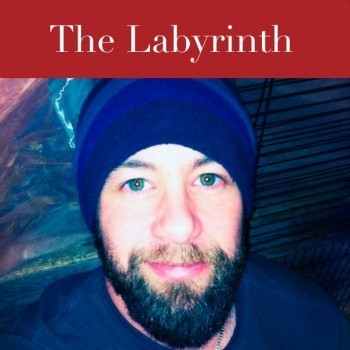 Nathaniel Wolfe is back. In this episode he illustrates Pragmataoism, a philosophy he’s implemented combining elements of pragmatism and Taoism. In this episode we talk about what Nathaniel used from both these philosophies, and how it interlocks with martial arts, sustainable farming, aquaponics, and chickens. Join us in a conversation about ethics and philosophy in this corridor of The Labyrinth.
Nathaniel Wolfe is back. In this episode he illustrates Pragmataoism, a philosophy he’s implemented combining elements of pragmatism and Taoism. In this episode we talk about what Nathaniel used from both these philosophies, and how it interlocks with martial arts, sustainable farming, aquaponics, and chickens. Join us in a conversation about ethics and philosophy in this corridor of The Labyrinth.
Subscribe and listen
Download and Listen: The Labyrinth 38 – Nathaniel Wolfe and Pragmataoism
iTunes
Subscribe via RSS
Stitcher
Links
Nathaniel Wolfe on Facebook
Nathaniel’s post, “Pragmataoism: The Practical Way of Acting Naturally”
William James’ “Pragmatism” (free on Amazon)
The Tao Te Ching (I couldn’t find a free version on Amazon, this one’s 99 cents)

